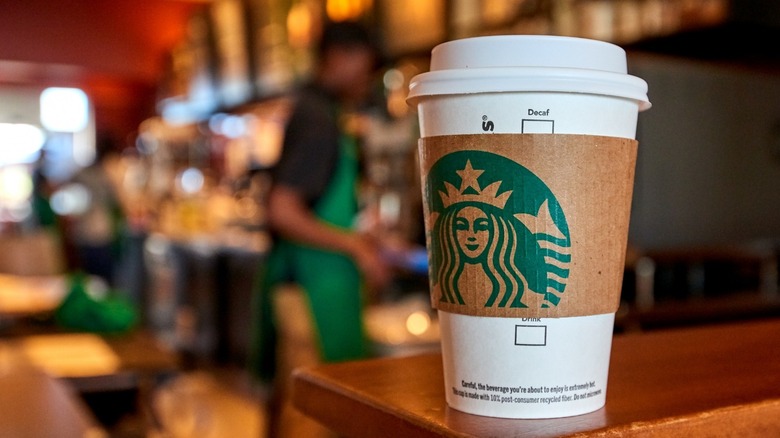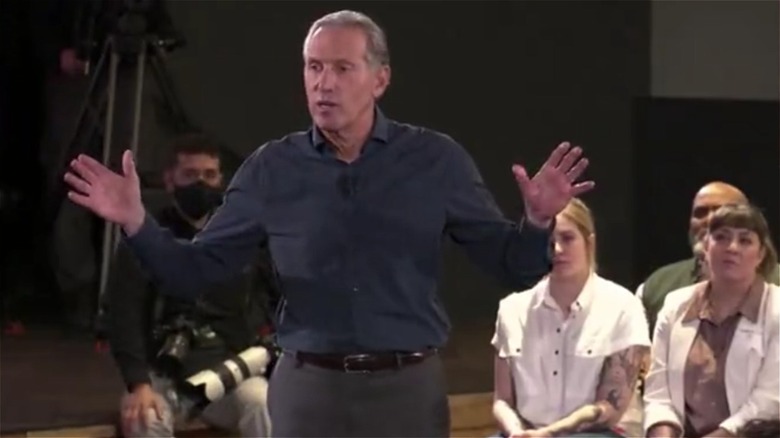Why The Starbucks CEO Thinks Unions Are 'Assaulting' Companies
Now 51 years into its journey toward dominion over the retail java business, Seattle-based coffee giant Starbucks now had over 32,000 stores in September 2020 (via Vetted Biz). Only about half were owned and run by Starbucks itself, with a total of 10,109 company-owned stores currently operating in the U.S. The remaining 6,528 were owned and run by licensees, i.e., individual operators who acquired a license to use the Starbucks name to sell Starbucks products but who are not contractually obliged to "follow any specific business plan or rules." This is important to understand when thinking about the current campaign by Starbucks employees to unionize because only employees of company-owned locations are considered Starbucks employees.
Based on 2020 figures, out of 32,000 stores in the world, unionization would directly impact fewer than 7,000. Of these, a mere nine Starbucks locations have voted to unionize thus far, and that number may soon dwindle to eight if Starbucks' challenge to the March 29 vote at its Knoxville, Tennessee location stands. Although another 160 or so are set to vote at this time (via Vox), the result may be no more than 16 more unionized locations – assuming the upcoming results follow the recent trend (10% unionized). Nevertheless, Starbucks' CEO, Howard Schultz is calling the move to unionize an "assault," not just on Starbucks but on "companies throughout the country," as recorded in a video clip that More Perfect Union posted to Twitter. So, what exactly is behind this dramatic take?
What does Starbucks CEO Schultz mean by 'assault'?
Soon after the first vote in favor of unionization (Buffalo, New York in December 2021), Starbucks management pushed then-current CEO Kevin Johnson to retire, replacing him with two-time veteran Howard Schultz. Schultz is known for having quelled efforts by Starbucks "partners" (i.e. employees) to unionize in the 1980s (per HuffPost). When Schultz returned as CEO in March, near the top of his "to-do list," according to the Wall Street Journal, was doing the same thing once again. But whether unionizing constitutes corporate assault, as Schultz maintains, would really depend upon what it is that unionizing is meant to accomplish.
Ostensibly, unionizing affords employees leverage in negotiating the terms of their employment with their employer (per Investopedia). That leverage comes in the form of having a powerful and experienced representative – i.e., a union – negotiating on their collective behalf. As soon as a company's employees unionize, federal law requires the company to commence good faith negotiations regarding how it treats its employees, including their wages, their time off, their overtime, and other employment fundamentals.
Schultz's main argument appears to be that Starbucks is doing just fine on its own vis-a-vis its employees, without the need for a union to act as an intermediary, per Vice. However, even assuming the truth of that claim (and many Starbucks employees would argue otherwise), it's not clear how these circumstances constitute an "assault" on the company, let alone companies overall.
How unionizing could impact Starbucks
Recently, Howard Schultz likened Starbucks employees to concentration camp prisoners in need of a blanket, and Starbucks to someone with a blanket who's willing to share (per Vice). What Schultz seemed to be pointing out was that the "blanket" should be everyone's primary focus because, without it, everyone is left to freeze. It would appear that in this comparison, the blanket represents Starbucks' resources, without which everyone is left out in the cold. Given that Starbucks is currently facing increased costs (hello, supply chain snafus), faltering optimism among investors, and decreased capitalization (via Seeking Alpha), among other serious challenges, it would appear that Schultz is concerned that the "blanket" is shrinking. Moreover, one could interpret Schultz's words as suggesting that paying higher wages and imposing other protections on Starbucks, the company, for the benefit of its employees, will have the effect of exacerbating these tensions.
What Schultz's metaphor does not address is how employee satisfaction, or dissatisfaction, as the case may be, is impacting commerce in general, per The Hill under the headline, "It's not a labor shortage, it's a wage and workers rights shortage." Nor does it seem to take into account that Starbucks is among a number of restaurants already raising prices to make up for rising costs relating to supply chain issues (via CBS News). And it arguably doesn't reflect that unionizing happens one location at a time, with the current score being 8 or 9 in favor and 10,000 undecided.


